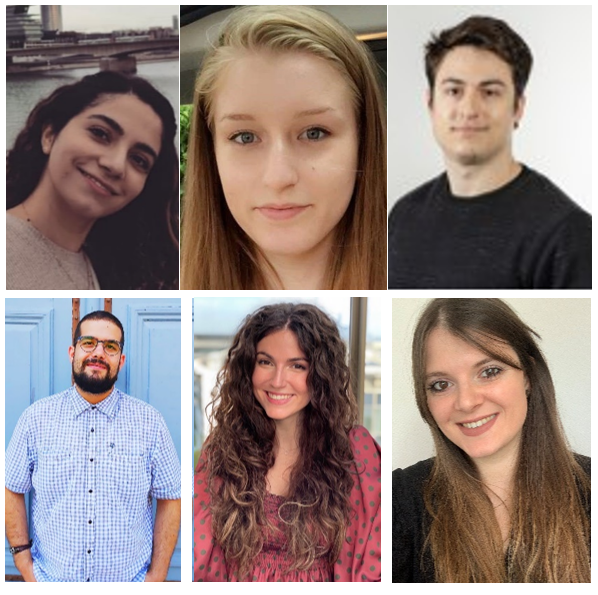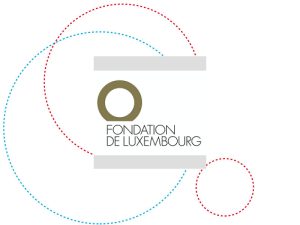On the 21st November 2022, Marianne Meyers, Cristian Angeli, Mahsa Rezaeipour, Alexandros Pailas, Cyrielle Holuka and Pilar Maria Moreno Sanchez have been awarded the Pelican Grant from the Fondation du Pélican de Mie et Pierre Hippert-Faber.
It is now 10 years that the grant is offered to students in support to their training and mobility activities in the context of their research projects.

What is your research project about?
Marianne: My research aims at getting a better insight into the role of the micrbobiome in colorectal cancer (CRC). We want to better understand the role of microbiome derived metabolites in CRC metastasis, in the hopes of this contributing to the development of microbiome based treatments for cancer patients.
Mahsa: “The main aim of my research project is to assess novel immunotherapeutic strategies against glioblastoma. We plan to assess the immunological status of glioblastoma tumor cells and cross-talk with immune cells in different microenvironmental niches. We will leverage innovative brain tumor models ex vivo based on patient-derived tumor organoids co-cultured with immune cells to test novel therapeutic strategies activating tumor cell death”.
Alexandros: “My PhD project is about the molecular mechanism of replication stress and DNA repair in Glioblastoma (GBM), the most aggressive brain tumour. In particular, using a novel gene-signature previously identified in the lab and patient derived GBM-stem like cells (GSCs), I am trying to elucidate how replication stress and the DNA Damage Response are the key factors that lead to chemoradiation resistance in GBM patients”.
Cyrielle: “My PhD project focuses on fundamental theories and concepts regarding early life, from conception to age 2, and how this relates to the development of chronic diseases. I am trying to understand how the environment we grow up in shapes our lifelong health. The aim is to consolidate the theory of the Developmental Origins of Health and Disease, extend it, and eventually improve life by preventing the switch from good to poor health down the line. This research approach involves a diverse array of domains including lifestyle improvement, environmental management, and health economics”.
Pilar Maria : “The main objective of my Ph.D. project is to expand NORLUX glioblastoma (GBM) patient-derived orthotopic xenografts platform towards immunocompetent models. More into detail, we plan to investigate the crosstalk of the immune component with GBM tumor cells, based on different mouse strains and so-called humanized mice, which have a partially reconstituted human immune system. Furthermore, we ultimately aim at using these new immunocompetent models in a proof-of-concept preclinical study with immunotherapies”.
Cristian: “My research project is titled “Personal Functional Profiling for Drug Discovery in Melanoma”. The main goal is to discover new combinatorial therapies to be use as second- or third-line treatment in melanoma patients that have developed drug resistance after standard of care treatment. Since 3D melanoma models are known to better reflect tumor architecture and heterogeneity than 2D models, I plan to use them in combination with high throughput drug screening to analyze over 1500 of drugs to discover new possible drug combinations. The validation of those hit drugs or drugs combinations will be done in primary melanoma cell lines and patient’s derived tumor samples”.
What will you do with the grant?
Marianne: The grant will allow me to go to DKFZ for a research stay to learn, as well as bring back, some state-of-the-art technology that allows us to study the microbe-host interaction in an organoid model. Additionally, it will allow me to attend a conference.
Mahsa: “I would like to visit the Tissue Microenvironment lab at the University of Zaragoza, Spain, for two weeks since they provide an innovative preclinical “organ-on-chip“ model, which appears as a promising technology for functional assessment of the crosstalk between tumor and immune cells within the hypoxia niches. I also plan to undertake an internship at the Department of Neurology and Brain Tumor Center, University Hospital Zurich to get familiar with the production pipeline of engineered immune cells and cytokines. The 3-weeks visit in the immunology expert group will be key for enlarging my knowledge in the immunotherapy development pipeline”.
Alexandros: “The pelican grant will allow me to visit the renowned lab of Dr. Ross Carruthers in the University of Glasgow to learn the DNA Fiber Assay. The DNA Fiber Assay is a state of art technique and the most used method for studying replication stress. Learning this technique will allow me to further understand the molecular mechanisms of chemoradiation resistance in GBM. Also, with the pelican grant I will attend one of the most important conferences of my field; the annual meeting of the Society for Neuro-Oncology (SNO), which will be held in Canada in November 2023”.
Cyrielle: “I would like to perform a latent growth curve model analysis (LGCM). This model is based on structural equation modelling to estimate growth trajectories over a defined time period in order to predict diseases in the early stages of life. In addition, this model also allows us to measure the pace of childhood development to understand the consequences of favourable and adverse environments”.
Pilar Maria : “With the support of the Pelican foundation, I will have a research stay at the laboratory of Dr. Dieter Henrik Heiland at the University of Freiburg. Herein, I will acquire experience in spatial transcriptomics and organotypic tissue cultures for ex vivo functional assays in GBM. These techniques will be critical for my Ph.D. project, as I plan to interrogate composition of the TME in GBM upon immunotherapeutic treatment. To further expand my knowledge in immuno-oncology I will also attend a summer school for early-career cancer immunologists in Verona”.
Cristian: “I will join Prof. Mitchell Levesque’s lab (Department of Dermatology, University Hospital Zurich, Switzerland) where I will learn how to establish, culture and characterize primary melanoma cell lines, derived from metastatic melanoma tumors. Moreover, I will gain experience in analyzing novel biomarkers for drug resistance development”.
About the Fondation du Pélican
The Fondation du Pélican de Mie et Pierre Hippert-Faber was founded in 2010 by Pierre Hippert and is managed by the Fondation de Luxembourg. The foundation seeks to provide long-term support in the field of scientific and academic research, as well as in the area of the arts and letters. In particular, the foundation finances research projects at the University of Luxembourg by giving scholarships and/or purchasing equipment in biomedicine in order to promote research activities in Luxembourg and develop the reputation of the University in this field.
Each year, the Fondation du Pélican awards a number of doctoral candidates affiliated with the programme in systems and molecular biomedicine of the Doctoral School in Science and Engineering (DSSE) at the University of Luxembourg. The Pelican grant can be used to finance their research. It can cover additional experiments, travel expenses to participate in conferences and training workshops, as well as short-term stays abroad as part of research collaborations.
